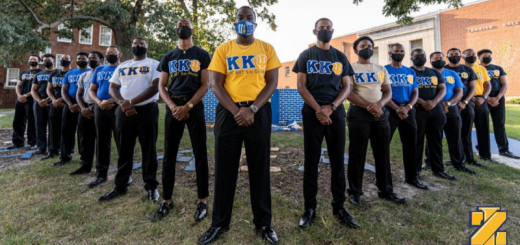Women in the Fraternity (Part 3)
by Dave Justin, First Printed in the Spring of 2002 edition of the Podium, KKΨ |
For Part 1 of this Story, Click Here
For Part 2 of this Story, Click Here
For Part 4 of this Story, Click Here
Editor’s Note: This is the third in a four-part series chronicling the history of women in Kappa Kappa Psi; part 1 appeared in the spring 2001 issue and part 2 in the fall 2001 issue.
The Merger at Arizona State
[dropcap style=”font-size: 60px; color: #0099FF;”]I[/dropcap]n the years prior to 1976, the Beta Omicron Chapter of Kappa Kappa Psi and the Sigma Chapter of Tau Beta Sigma at Arizona State University saw their membership decline. Friction began to grow between the two groups, and members began to lash out at one another.
“The chapters’ membership had dwindled down to eight for Kappa Kappa Psi and ten for Tau Beta Sigma,” Leslie Anderson, past Beta Omicron Chapter president recalled. “There was a lot of animosity between the two groups.”
In an effort to release some of that tension and under the supervision of Dr. Robert “Coach” Fleming, then-assistant director of bands, the chapters decided to merge into one organization, combining all aspects of their chapters with the exception of their rituals.
In January 1977, the chapters presented a letter to the national officers requesting permission to completely merge:
We have found that through joint projects we are able to accomplish more with less internal conflict. By working together, our fraternal functions have become more productive, beneficial and rewarding to the individual members. Therefore, the chapters have decided unanimously to request your permission to merge. (letter from Beta Omicron & Sigma, January 26, 1977)
After returning from the 1977 National Convention at the University of California at Los Angeles where the National Constitution was amended to remove all mention of gender, the women of the Sigma Chapter voted unanimously to become members of Kappa Kappa Psi.
On August 26, 1977, Patricia A. Childress, Lydia L. Lennon, Leslie A. Anderson, Mary L. Duffala, Mary M. Ketterer, Kristina M. Zipsnis, Clara M. Bertilson, and Toni Ryon were initiated into Beta Omicron. On August 27, 1977, Lea F. Fuller was initiated.
Today, if two chapters merge, the members from the other organization are known as Associate Members, but as that membership status did not exist in 1977, these women are known as the first active women in Kappa Kappa Psi.
The merger became a huge success for Beta Omicron. The first election resulted in a female president, secretary, and historian. That year, they initiated twenty-three new members bringing their chapter total to forty-one brothers.
Darragh (Hill) Young
At Wichita State University, the brothers of Beta Tau were well aware of Title IX but did not take it seriously. As a joke, they sent bids to three women in the band. An eighteen-year-old freshman percussionist named Darragh (Hill) Young accepted.
In the fall of 1976, Young was the Wichita State marching band’s only freshman squad leader in a male-dominated drum line. Standing only five feet tall and weighing ninety pounds, she had learned long ago that drummers respected attitude. When necessary, she would get in an older percussionist’s face and just scream at them.
“They must have thought I was crazy or had some really advanced self-defense techniques, because it worked – not sure why,” she said. “I was just bluffing.”
Choosing Kappa Kappa Psi over Tau Beta Sigma was an easy decision for Young.
“It appeared to me the only thing that Tau Beta was doing was using the Kappa rank and file as fodder for husbands and that was the farthest thing from my mind,” Young recalled recently. “Kappa, on the other hand, did all the work for the bands.”
In the spring of 1976, Young experienced a membership education program full of hazing, but it differed from the treatment that her pledge brothers were subject to.
“There were two guys that did not want me in the chapter, period,” Young said of her freshman year. “But they never ‘de-pantsed’ me or froze my underwear like they did to the guys. I did, however, have to display gentlemanly behavior at all times. So I had to open doors for people, play bartender, light cigarettes, serenade visiting artists on bended knee, etc.…”
The members of Tau Beta Sigma were not very supportive of her decision to join Kappa Kappa Psi.
“Most of them either blew me off or got real nasty with me,” Young said. Some of them started rumors about me, but by the time I was initiated, the majority of guys had become real protective of me.”
She completed her membership education in April 1977, making her the first woman to go through a formal membership education program in Kappa Kappa Psi, but due to an overwhelming schedule, the chapter did not initiate her class until September 1, 1977. On initiation night, one of the actives that had given her a really hard time told her she had proven herself and that he was proud to call her “brother.”
Young is a Life Member of the Fraternity and is still very close to the brothers with whom she was active. She continued to stay involved as an alumnus until about four or five years ago.
Young’s initiation date, September 1, 1977 was just five days after the merger at Arizona State University. To this day, Young is the only woman to become an active at the Beta Tau chapter by completing the chapter’s formal membership education program.
First Experiences
In the fall of 1978, at West Virginia University, the Omicron Chapter vice president, Danny Wetsch, called the national office to ask if they could extend bids to women. The response was, “Yes, you can, but we don’t recommend it.”
The bids were passed out and Deb Eakins and Marie Burleigh were two of the first three women to join the Omicron Chapter.
“I didn’t find out until ten years after my initiation that the national office said what they did,” Eakins said. “Danny originally came back to me and said that their response was ‘yeah, you can.’ Amazing the difference that just a few words make.”
So what would make a chapter such as Omicron change suddenly and start recruiting women?
“The federal government was going to stop any government funding to organizations or schools and/or their organizations that did not comply and allow anyone of either sex, that qualified to become a member,” Wetsch recalled. “This issue forced organizations to become co-ed or else the school, in this case, would not receive any further government funding. Our Kappa chapter decided that it was in the best interest of the chapter and the school to comply as soon as possible and allow the three women to become members…their qualifications were also a big factor in the decision to go co-ed.”
When Eakins and Burleigh were initiated, there were two female district officers on the District IX Council, now the Northeast District Council. Barbara Burtell and Gail Kulusich of the Epsilon Phi chapter at Clarion University of Pennsylvania were elected at the 1978 District IX Convention to serve as Secretary and Alternate District Representative, respectively. They were initiated into the Epsilon Phi Chapter in April of that same year.
“They were nominated from the floor to run against a couple of jerks, just to have some competition,” said Rick Albani, former District IX Governor. “They won by a landslide because they were very popular among the other delegates.”
One year later, at the 1979 District IX Convention, Kulusich did not attend due to a prior obligation…she was competing in a beauty pageant, where she placed second. Her absence did not help win support for women in the Fraternity.
“I don’t know what the circumstances were around Gail’s election,” Burleigh recalled, “but consider this: the oath of office says something along the lines of, ‘to shirk is to betray a trust.’ Gail was one of the first women in the district to be elected to office, and she decided a beauty pageant was more important that district convention. What did that say about her commitment to the Fraternity? Didn’t win women in general any friends or positively influence anyone.”
Although the brothers at Omicron were very supportive of women in the Fraternity, not all the male members shared this sentiment.
When National President Donald Stanley asked for the delegate from the Omicron Chapter to take his chair at the National Convention at Georgia Tech in 1979, Burleigh walked down the aisle and took her seat amidst gasps and murmurs from the delegation. When other women were seated as delegates, boos and hisses began to find their way to the floor.
At the 1979 National Convention, J. Lee Burke asked to address the delegation. Sitting as the delegate for Omicron, Burleigh was on the front row.
“J. Lee looked at me and said, ‘Brothers and… uh…uh…uh…’ and never quite finished that sentence, moving on to his remarks,” she recalled. “I explained to him afterwards that he didn’t have to say anything special for me. I was just another brother.”
Eakins has similar recollections about Burke.
“Bless J. Lee’s heart,” she said. “He had no problem with women in the Fraternity, but he kept trying to figure out how to avoid having to explain to the general public about women being called brothers.”
In 1980, Eakins ran for District IX Member-at-Large in a race against two male brothers. She won and was reelected the following year. Despite her success, she still met opposition.
“I resented the idea that someone would question my dedication, loyalty and brotherhood simply because of my gender,” she said. “Much of the attitude of the brothers and sisters was ‘You can’t do it, you are just a girl, TBS is meeting over there.’ They would tell me that I was not a real brother. Ironically those particular guys were not ones who put much effort or remained involved in the Fraternity or their band programs. It’s been over twenty years since I became a brother of Kappa Kappa Psi and I still follow the ideals on the local, district and national levels of the Fraternity in a variety of ways, from supporting the local bands and working as past president and on the board of the WVU Alumni Band, to the various roles in the Fraternity on the local, district and national level.”
In 1989, when the National Chapter voted to call all members of the Fraternity “Brothers” regardless of gender, J. Lee Burke grinned and said he would be honored to call everyone brothers.
Deb Eakins is currently the National Vice President for Programs. She served as Northeast District Governor from 1995-2001. She also serves the Omicron Chapter as sponsor.
Marie Burleigh is now serving as Northeast District Governor. She was asked to fill the position when Eakins was elected to the national council.
…to be continued.
Author’s Note: The fourth and final part of this series will feature prominent female leaders in the Kappa Kappa Psi, the view of female members in the Fraternity, and a statistical analysis of female membership.





4 Responses
[…] For Part 1 of this Story, Click Here For Part 3 of this Story, Click Here […]
[…] For Part 2 of this Story, Click Here For Part 3 of this Story, Click Here […]
[…] For Part 1 of this Story, Click Here For Part 2 of this Story, Click Here For Part 3 of this Story, Click Here […]
[…] For Part 1 of this Story, Click Here For Part 2 of this Story, Click Here For Part 3 of this Story, Click Here […]